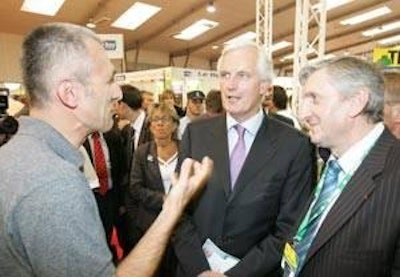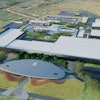
The 21st SPACE livestock show at Rennes, Brittany attracted a record crowd including France's new president, Nicolas Sarkozy who, like many of the 111,000 visitors and 1300 exhibitors, must have realised that his country's poultry, pig and rabbit farmers will need all of their renowned ‘savoir-faire' to cope with soaring feed prices.
Impacts of AI not forgotten
In 2006, avian influenza (AI) was the crisis overshadowing SPACE, France's leading farm livestock show at Rennes. The menace of the highly pathogenic strain of the AI virus H5N1 was still there this year but the industry in France is learning to live with the threat. Top of the list of concerns in 2007 was the soaring cost of wheat worldwide and its effect on feed prices.
These price rises can be put into perspective using the system from Itavi, France's statistical bureau. They established a base of 100 for poultry feed prices in January 2001. In September last year, price indicators for turkey and chicken feeds were in the mid-90s. By June 2007, the indicators had leapt up to 105 and 111 for turkeys and chickens, respectively.
"Feed prices were for sure the key topic as producers try to come to terms with spiralling costs," said Jim Hunnable, Hubbard's business development manager. "But the mood, as is typical of this industry, was one of resilience. Chicken supply is short due to decisions made last year because of AI but prices are not moving the way they should, particularly bearing in mind world wheat prices."
Richard Hutchinson, sales and marketing director British United Turkeys reported a similar situation. Due to reductions in breeding flocks at the height of the AI scare last year, turkey meat is in short supply.
Visits to local poultry units were cancelled as they had been last year. One was scheduled but called off due to ‘health concerns'. Two companies that were missing from the show in 2006 LDC, the nation's largest poultrymeat operation, and the Sicamen hatchery in the Loire Valley felt that it was safe to exhibit in 2007. Both were convinced that their protest was justified.
Last year, the only occupant on the Sicamen stand was a TV with a video message explaining that it was a protest at the way the government had handled the AI situation, costing the company over 1 million. This year, the stand had a good flow of visitors, a number of whom told Mathieu Lemarie how they agreed with the protest against lurid press headlines and the compensation arrangements.
Among the guests on the busy LDC stand was Gerard Terrier, president of the Poulet de Bresse operation, the icon of French chicken production on the same side of the country as the nation's only commercial AI outbreak so far. A flock of 11,000 turkeys was involved at the beginning of 2006 and three H5N1-affected swans have been found since.
Every possible precaution is being taken to keep the disease out but the flocks are free-range and inevitably vulnerable to the wild bird population and passing migrants, Mr Terrier pointed out. Flock size is limited to 500 birds and just one million Bresse birds are reared in a year 20,000/week.
The birds are reared locally and subject to AOC certification in the same way that wine is guaranteed French, grown in a specific area and to a certain quality standard.
In recent years, Bourg has become a tourist centre. Hotels and restaurants all flourish their Bresse credentials, an outsize cockerel dominates the high street and there is a ‘Poulet de Bresse' service station on the nearby A6 highway.
Presidential visit
Once again, the organisers of SPACE demonstrated their ability to attract the top politicians to the show. This year, they hit the jackpot.
Just three months after his election as France's new president, Nicolas Sarkozy flew down to Rennes to open the 21st SPACE exhibition, and speak of his ambitions for agriculture in France and the EU. He also spoke of the challenges of AI, of soaring feed prices and the need for farmers to get a fair return for their labour, investment and savoir-faire'.
SPACE president, Jean-Michel Lemetayer, claimed that the feed price crisis threatened the future of livestock industries right across the board.
"The new global market situation is restoring the producers' role. A new balance has to be found and soon to enable poultry, pig and rabbit producers to recoup these intolerable increases. The very future of these farmers is at stake and the world is going to need farmers if the eight billion people that will be on the planet in 2050 are going to be fed," he said.
Mr Lemetayer described the president's visit as homage not only to livestock farming, the best of which was on show at Rennes, but the whole of agriculture. SPACE 2007 was an expression of farming's renewed confidence in the future.



.jpg?auto=format%2Ccompress&fit=crop&h=167&q=70&w=250)

.jpg?auto=format%2Ccompress&fit=crop&h=167&q=70&w=250)











